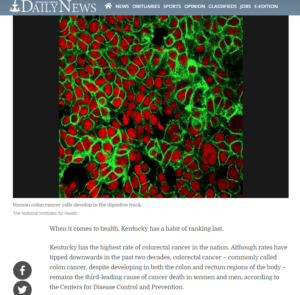Dr. Whitney Jones was recently featured in a Bowling Green Daily News article about how Kentucky’s lifestyle and genetics are contributing to high colon cancer rates.
The article highlights some alarming statistics. According to the Centers for Disease Control and Prevention, Kentucky has the highest rate of colorectal cancer in the nation, and it is the third leading cause of cancer death in women and men.
Lifestyle Causes of Colorectal Cancer Include
- Lack of exercise
- Diet high in processed red meat and low in fruits and vegetables
- Obesity
- Excessive alcohol consumption
- Tobacco use
The Centers for Disease Control and Prevention ranks Kentucky as the second highest state in the nation for tobacco use. What’s more, over two-thirds of adults in Kentucky are overweight, less than a tenth eat enough fruits and vegetables, and more than a third do not exercise regularly.
In addition to harmful lifestyle habits, a family history of colorectal cancer puts patients at a higher risk for developing the disease themselves.
Dr. Whitney Jones, a gastroenterologist with Gastroenterology Health Partners in Louisville is a national expert and frequent speaker on early-age onset colorectal cancer prevention, as well as genetic GI cancer syndrome testing, risk management and communication strategies for population-based cancer prevention.
Founder of the Colon Cancer Prevention Project, an organization dedicated to colon cancer prevention, Dr. Jones is an advocate for utilizing genetic testing to improve patient outcomes and lower cancer-related societal outcomes. The article notes a bill recently passed by Kentucky legislators that requires health insurance to cover genetic tests for cancer when recommended by licensed medical professionals.
DNA testing can help expose those with genetic risks for colorectal cancer and determine the appropriate age for them to begin screening. In his work, Dr. Jones recognizes a correlation between low screening rates and high incidences of colon cancer and mortality rates. “Only one in 10 people get genetic testing before developing cancer. If you know you were going to have a car wreck next Thursday, what would you do?”
Read the full article here:





